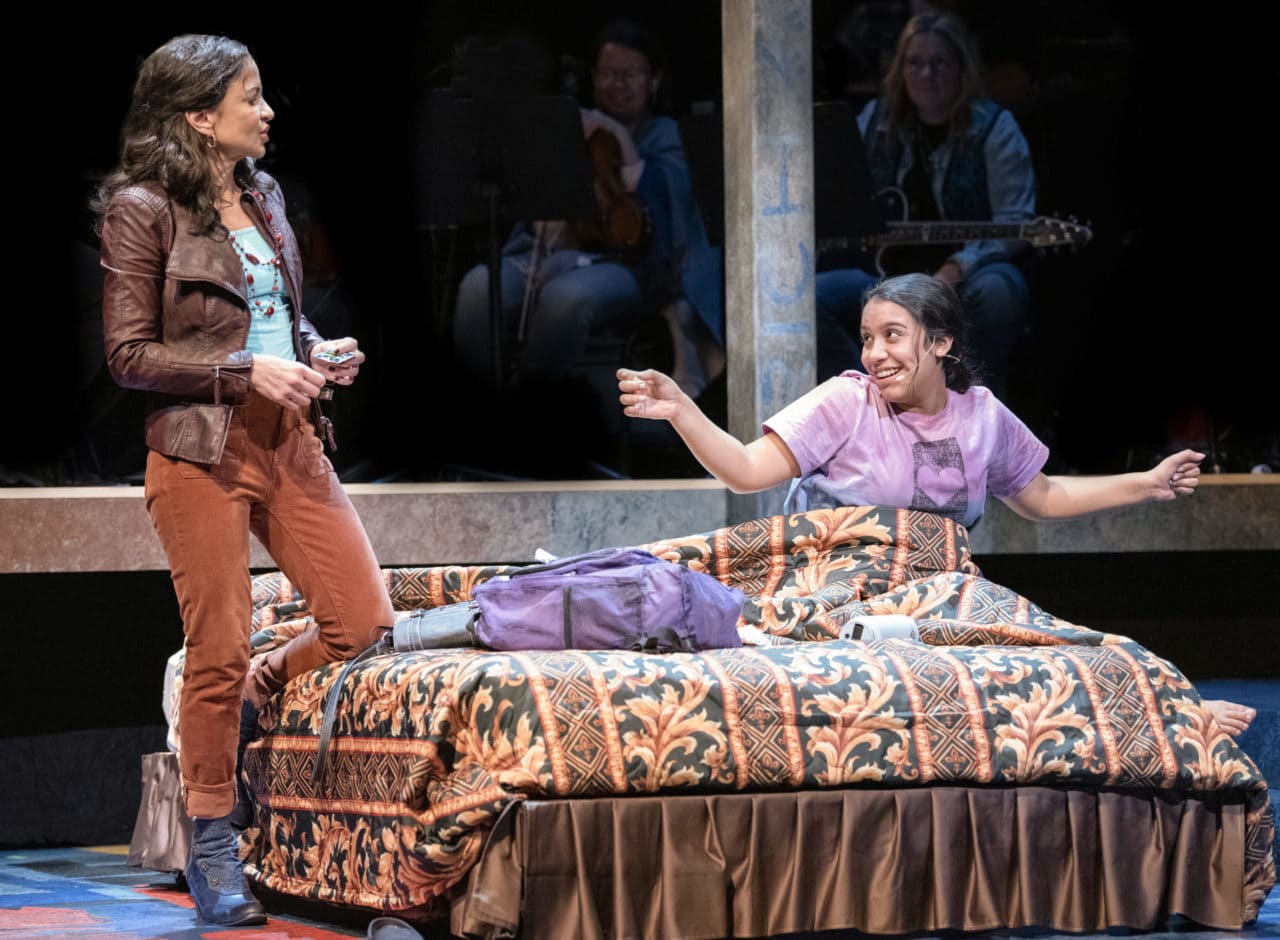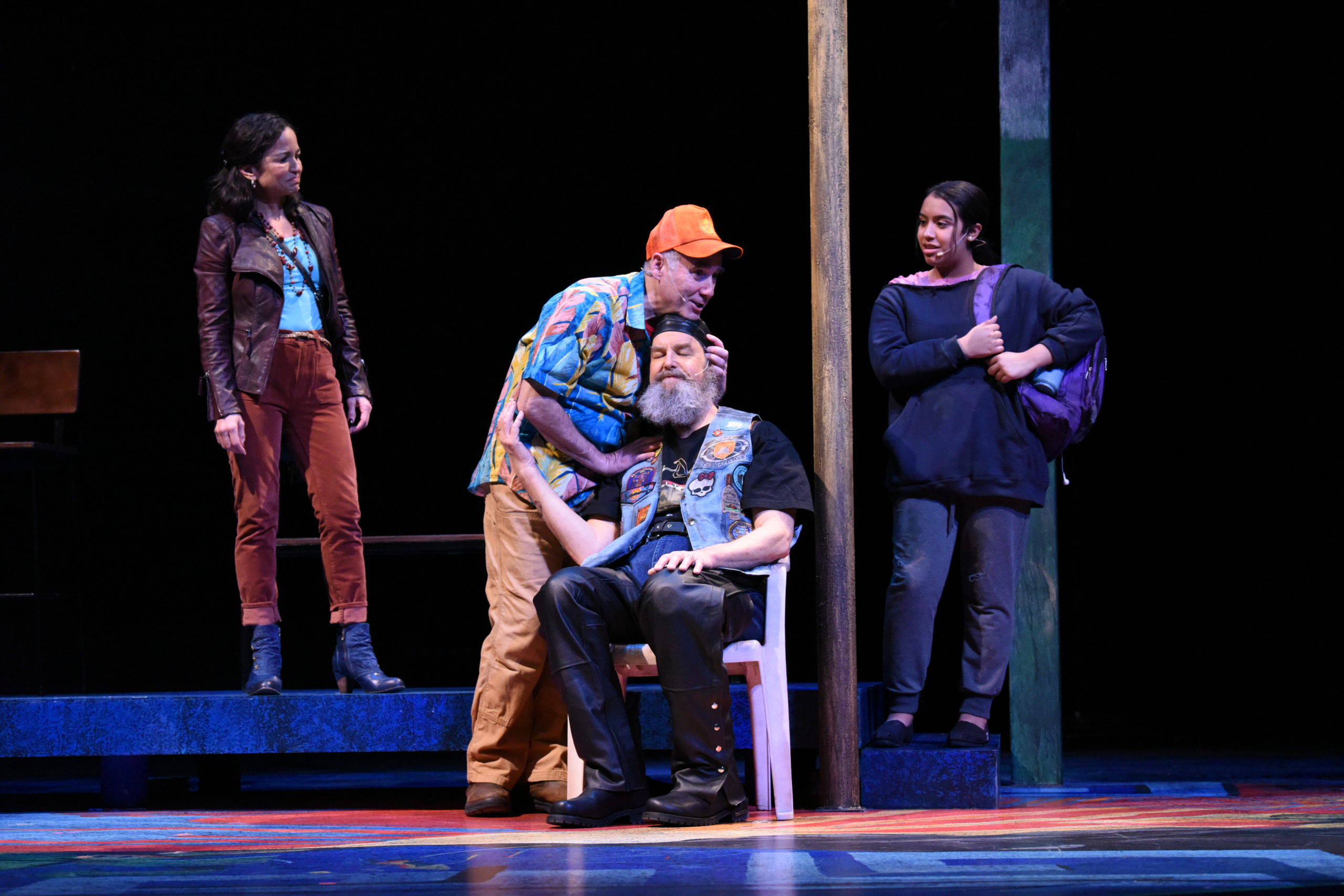At Friendship Park, on the US-Mexico border just south of San Diego, from 10 am to 2 pm Saturdays and Sundays, 10 people at a time on the US side can see, and talk through a fence, with friends or relatives on the Mexican side for 30 minutes. Touching fingers through the wire mesh used to be allowed; it is no longer. The park is both a physical space and a metaphor for the separations created by the gated community that the US is on its way to becoming.

Separation, and trying to overcome it, are major themes of Miss You Like Hell (book and lyrics by Quiara Alegria Hudes; music by Erin McKeown), now playing at Olney Theatre Center. The central separation is between Beatriz (Karmine Alers) and her teenage daughter Olivia (Valeria Morales). A whirlwind of energy, full both of the life force and contradictions, Beatriz has come from her home in Southern California to meet Olivia in Philadelphia. They haven’t seen each other in four years, since Beatriz, an undocumented immigrant, lost a custody battle with Olivia’s American citizen father.
A virtuoso of mixed motives, Beatriz has come to Philadelphia because on her blog, “Calling All Castaways,” Olivia has mused about jumping off the Ben Franklin Bridge. Beatriz also hopes to use her daughter as a character witness in an upcoming deportation hearing happening in a week in Los Angeles, a point she does not reveal to Olivia until partway through the trip.
Initially, Olivia is resistant, deeply resenting her mother’s seeming desertion. Whip-smart, precociously well-read, living in her head (she says she is dead below the neck, an assertion somewhat belied by her equally precocious sex life), Olivia is a complex, interesting character whose need and anger Morales explores with confidence and subtlety. Ultimately, she is able to understand her experience as an amalgam of her mother’s life and those of people she has met along the way, as she expresses the show’s title number. The two lead performances are the production’s strongest suit, and both actors lend vibrant voices to the songs they are given.
The production’s greatest problem is the depiction of the road trip itself, which for a purposeful cross-country journey feels curiously static and disconnected. Part of the reason is the playwright’s choice to send Beatriz and Olivia on side trips – digressions, it’s fair to say – including to places like South Dakota and Wyoming that do not fall on any plausible route between Philadelphia and Los Angeles.
The physical production does not help. In place of the representation of an actual vehicle, the show uses two high-back red stools that might have graced someone’s kitchen bar in the 1980s. A too-narrow upstage screen displays projections of motels where the travelers stay or an empty two-lane road. (Apparently, the travelers, deadline notwithstanding, choose not to use the interstate system.) Milagros Ponce de Leon’s multilevel, multicolor set is not able to create a sense of place or a sense of movement. The most effective moment for the design is at the end of the show when a large flown-in set-piece puts an exclamation point on the theme of separation.
Choreographer Breon Arzell tries to create a sense of movement, but the design, however lively, is often repetitive, featuring much quick-stepping and extensive swirling of arms. The ensemble executes the movement with fine energy, however. The use of a dance between Beatriz and Olivia to symbolize their rapprochement in “Dance with Me” works well.
The ensemble, strong singers all, are labeled the “Castaways,” readers of and commenters on Olivia’s blog. They also portray a representationally diverse assortment of characters Beatriz and Olivia meet along the way.

Notable among them are Mo and Higgins (Bradley Mott and Lawrence Redmond), a nurturing gay biker couple in their late 60s who are on a mission to get married in each of the 50 states. Their “My Bell’s Been Rung” is the score’s cutest number. As Pearl, a junior park ranger and follower of Olivia’s blog, Kayla Gross displays the outstanding voice in the cast, notably in “Yellowstone.” As Manuel, a tamale vendor who Beatriz and Olivia encounter in South Dakota, Carlos L. Encinias delivers the gentle, reflective “Tamales,” recalling the love conveyed through work with his wife in the kitchen.
Walter “Bobby” McCoy’s orchestra, positioned on a platform upstage right of the playing area, does a fine job with McKeown’s eclectic score; many of its numbers are forgettable. As a general matter, the quality of the performances often exceeds the quality of the material.
Underlying the road trip and its destination is the US immigration system, which, of course, has become even more draconian since the 2014 setting of the show. Even for Beatriz, who unlike many undocumented immigrants is fluently bilingual and has competent legal representation (Kara-Tameika Watkins has nice moments as her lawyer), the smallest hiccups – a years-old marijuana possession conviction, a broken tail light – can spell disaster. Normal people doing their normal jobs in “the system” – a court clerk, a traffic cop, an immigration judge – can disrupt a family in the normal course of business without a second thought.
One of the show’s successes is underlining that for people like Beatriz and Olivia, the political becomes highly personal. True enough that, for anyone this side of Stephen Miller, the point that undocumented immigrants are real people with real feelings, deserving of respect and empathy, is obvious. But seeing well-acted characters like Beatriz and Olivia resolve their personal separation in the context of legally-enforced separation adds very specific force to that general principle.
Running Time: One hour and 45 minutes with no intermission.
Miss You Like Hell plays through March 1, 2020, at the Olney Theatre Center, 2001 Olney Sandy Spring Road, Olney, MD. For tickets, call (301) 924-3400 or go online.





I want to underscore the passion in this production, which I saw on the Friday before opening night. The dynamic between mother and daughter was universal yet poignantly particular — the story travels beyond the story of undocumented immigrants –to issues of mental health and mother-love. The voices of the two main characters travel far as well. Beatriz played by Karmine Alers) and her teenage daughter Olivia played Valeria Morales, who I believe is only a local high school freshman, perform heart-rendering duets–as well as solo pieces, which leaped off the stage. I loved the mix of English and Spanish in song by Beatriz, and the struggle with language on multiple levels by the depressed/suicidal Olivia. Perhaps I responded to this play as a mother of a teenage daughter, perhaps I responded as someone who teaches young people, many who are undocumented, and perhaps I respond now as someone who believes the political is always personal, especially in these times, and theater, this theater, is doing its job to bring it to the forefront with flair and energy and vitality. Respectfully, I want to urge you to not to miss MISS YOU LIKE HELL.